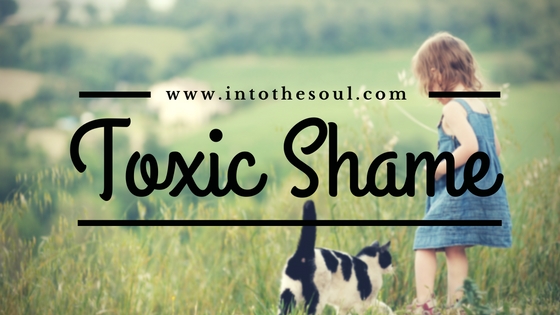Unlike ordinary shame, “internalized shame” hangs around and alters our self-image. It generally lies beneath our conscious awareness, but can easily be triggered, for some it is the underlying theme upon which their entire identity is built – a shame-based identity.
Characteristics of Toxic Shame
Toxic shame differs from ordinary shame, which passes in a day or a few hours, in the following respects:
- It can hide in our unconscious, so that we’re unaware that we have shame.
- When we experience shame, it lasts much longer.
- The feelings and pain associated with shame are of greater intensity.
- An external event isn’t required to trigger it. Our own thoughts can bring on feelings of shame.
- It leads to shame spirals that cause depression and feelings of hopelessness and despair.
- It causes chronic “shame anxiety” — the fear of experiencing shame.
- It’s accompanied by voices, images, or beliefs originating in childhood and is associated with a negative “shame story” about ourselves.
- We needn’t recall the original source of the immediate shame, which usually originated in childhood or a prior trauma.
- It creates deep feelings of inadequacy.
Shame-Based Beliefs
The fundamental belief underlying shame is that “I’m unlovable — not worthy of connection.” Usually, internalized shame manifests as one of the following beliefs or a variation thereof:
- I’m stupid.
- I’m unattractive (especially to a romantic partner).
- I’m a failure.
- I’m a bad person.
- I’m a fraud or a phoney.
- I’m selfish.
- I’m not enough (this belief can be applied to numerous areas).
- I hate myself.
- I don’t matter.
- I’m defective or inadequate.
- I shouldn’t have been born.
- I’m unlovable.
- I wish I was dead.
The Cause of Toxic Shame
In most cases, shame becomes internalized or toxic from chronic or intense experiences of shame in childhood. Parents can unintentionally transfer their shame to their children through verbal messages or nonverbal behavior. For an example, a child might feel unloved in reaction to a parent’s depression, indifference, absence, or irritability or feel inadequate due to a parent’s competitiveness or over-correcting behavior. Children need to feel uniquely loved by both parents. When that connection is breached, such as when a child is scolded harshly, children feel alone and ashamed, unless the parent-child bond of love is soon repaired. However, even if shame has been internalized, it can be surmounted by later positive experiences.
If not healed, toxic shame can lead to aggression, depression, eating disorders, PTSD, and addiction. It generates low self-esteem, anxiety, irrational guilt, perfectionism, and codependency, and it limits our ability to enjoy satisfying relationships and professional success.
Toxic Shame prevents a person from being their authentic self… you cannot embrace your future whilst you are struggling with the shadows of the past. Shame, in all its forms, also prevents us from connecting at our highest level to spirit. In the grips of negative emotions, our ability to connect to others and to spirit is overshadowed by the fear state that is consuming us. So in order for us to reclaim our birthright – a meaningful connection to spirit, to ourselves and others, we must face our fears and let go of toxic shame.
There are a number of methods suggested for releasing negative energy such as toxic shame on intothesoul.com – look at Letting go of Negative Energy and White Light Healing to start with.

